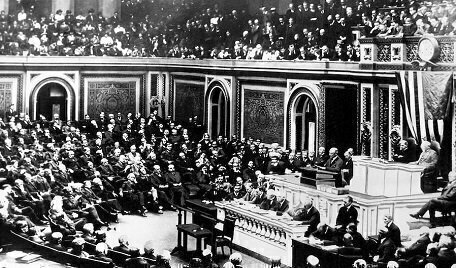President Woodrow Wilson’s speech to Congress on January 8, 1918, made the United States a global player in the world of foreign diplomacy, as his 14 Points statement established a framework for peace after World War I.

The speech to a joint session of Congress was not without controversy, with former Presidents Theodore Roosevelt and William Howard Taft among its harshest critics. And some of its key components weren’t part of the Versailles Treaty, which was never ratified by the United States Senate.
But the 14 Points speech was a uniquely American vision of freedom that extended to a reorganization of Europe after the war that would have a profound impact for decades.
President Wilson’s speech came about nine months after the United States entered the European war. It came about as part of a project called The Inquiry. At the President’s request, diplomat Colonel Edward House built a team of 126 academics to study the causes of war in Europe and offer solutions, especially in the areas of territorial claims and disputes. The Inquiry worked in secret, compiling about 2,000 separate reports, which included analyses of American global foreign policy.
Wilson’s speech was a synthesis of The Inquiry’s findings along with his idealist vision of global relations. The 14 Points called for a just peace for all parties involved in the Great War, the end of secret treaties between nations, free trade among nations, freedom of the seas, self-determination for people under colonial rule, and an international group like the League of Nations to deal with world security.
The 14 Points document was then used as a part of a promotional and propaganda campaign in Europe. Initially, it received support from European leaders, and Germany asked to be treated under its provisions when it ended hostilities against the Allied forces.
But as the Versailles Treaty was negotiated, key components of the 14 Points document fell by the wayside. Great Britain objected to its freedom of the seas component, and much harsher peace terms were imposed on Germany.
The frail Wilson became ill in Paris and suffered a series of strokes in 1919 as the fight over the League of Nations was underway in the United States. Still, President Wilson personally presented the Versailles Treaty to the Senate in July 1919 for ratification.
The League of Nations, a critical part of the 14 Points, was the subject of much debate in the Senate. In September 1919, Senate Majority Leader Henry Cabot Lodge introduced a version of the treaty for debate on the floor, with reservations that limited the need for the United States to join a military action called by the League of Nations.
However, votes to ratify the Versailles Treaty, with and without Lodge’s reservations, failed on November 19, 1919. The Versailles Treaty would come back for another vote in March 1920, only to fail again.
Other principles in the 14 Points document remained in the Versailles Treaty approved by other nations. It also represented the American political philosophy of the Progressive movement on an international state. Wilson would receive the Nobel Peace Prize in 1919, partly due to the 14 Points document.
But left unsettled at Versailles were issues that Wilson addressed that would become part of the lead up to a second World War a generation later







